Last update: 24 September 2023
On the 26th of May 2023, a new and popular Portuguese Netflix show was released with the original title "Rabo de Peixe" – also known as "Turn of the Tide" in English. It quickly became a hit in its homeland Portugal as well as reaching top 10 in more than 20 countries. But what enables a Portuguese series to become so popular abroad? It really never would have been possible without quality translation. Here I'm going to look specifically at the title translation into other Nordic countries and what may have been the idea behind it.
Starting Point: Importance of Translation
No matter how good a movie or a series is, it won't be able to succeed outside its original borders without high-quality subtitling and dubbing – and "Turn of the Tide" is a great example of that. While some would argue that Portuguese is a widely spoken language, it's important to notice that even in Brazil, the series was dubbed and the title was changed (but I'll get back to that later in this blog) to appeal to the market and the neighboring country Spain also needed both dubbing and subtitles, despite the relative proximity of the languages. Yes – not even José Condessa's abs alone would have been able to persuade them to watch the series.
Let's be honest. There are very few translators who translate from Portuguese to Danish, Greek, Chinese, and Dutch – even fewer who do audiovisual translations between smaller languages. Thus, an intermediate language – also called a pivot language – is used. In most cases, that would be English. So first of all, let's recognize the amazing job that many of the translators do out there, securing high quality in the pivot languages so that other translators have a reliable source to translate from.
Navigating the Waters of Title Translation
When it comes to translating titles for TV shows and series, each country has its own tradition. If a specific language/locale decides to translate a title, I can promise you that a lot of blood, sweat, and tears go into the process: it involves capturing the essence, mood, and cultural nuances of a work while ensuring that it resonates with the target audience. In most cases, you literally only have a few words to capture and entice the people back home behind the screen who are death-scrolling the Netflix catalog to find something new to watch. A great example of this is the Portuguese Netflix show "Rabo de Peixe" and how different title translation strategies were chosen across the Nordics, Germany, and the Netherlands.
Picture source: Netflix
Let's Have a Look at The Original Title: Rabo de Peixe
The Portuguese title "Rabo de Peixe" directly translates to "Fish Tail" in English, and as you read that you might already think to yourself that it isn't the most enticing title. And you're right. While the interpretation did make its way into the visual art, there are other good reasons why this didn't end up becoming the English title.

Picture source: Netflix
First of all, direct translation is often a poor idea and rarely conveys the same feeling as in the original. Secondly, this is actually the name of a freguesia (civil parish) on the Azorean island of São Miguel, where the story unfolds. To the Portuguese people, the title evokes images of a small fishing town and the surrounding seascape, and their imagination is instantly transported to a specific setting just by reading it.
With the idiomatic expression "Turn of the Tide", English keeps the aquatic theme alive while still hinting that we will experience something dramatic and unexpected. A title that is supposed to lure you right in. Someone did a great job here.
Scandinavia: Cultural and Linguistic Reflections
In Scandinavia, it used to be that we didn't translate titles of foreign shows from other European languages such as German, French, Spanish, Portuguese, and Italian if the words in the titles were easily understood. Many common words in other Indo-European languages will be recognizable to speakers of Danish, Swedish, and Norwegian – either because they're very similar or because we've been commonly exposed to them one way or the other. The same goes for other Scandinavian languages among ourselves.
That means that Spanish titles like "Amar" or "Dos", the German "Der Untergang" (would be the word "undergang" in Danish), and other similar titles wouldn't be translated. Actually, by not translating the title, we indicate to the viewer that it's a non-English and/or non-Danish title. This is important information to the viewer as we don't use dubbing – only subtitles – and many don't feel completely comfortable watching foreign-language shows.
It should, however, be said that I've noticed a movement away from this type of practice and more and more titles now seem to be translated into e.g. Danish, Swedish, and Norwegian. And with the kind of data Netflix has, it could be extremely interesting to take a deep dive into whether or not this has changed consumer behavior.
The Translation Process: Did They Do The Original Dirty?
Translating titles involves a delicate balancing act. "Rabo de Peixe" is more than a geographical location in the minds of the Portuguese. To them, it might give a sense of simplicity and community, which contributes to the atmosphere of the story. However, this will not be the case for a Scandinavian audience. To be honest, I think very few of us would know what it was – let alone it being in Portugal. Thus, we have to find other ways to try to honor the original, convey the ambiance, and still keep the fascinating elements that lure them in and make them press the play button.
Denmark 🇩🇰, Germany 🇩🇪, and the Netherlands 🇳🇱
For the translation of Rabo de Peixe in Danish, German, and Dutch. It seems rather obvious what they've done. Well, cause they didn't. The logic here is probably that it wouldn't make sense to translate a proper noun and they preferred keeping the original title instead of trying to come up with something new.
Sweden 🇸🇪, Norway 🇳🇴, and others
The Swedish title "Den största fisken" and the Norwegian title "Den største fisken" both translate into "The Biggest Fish". As you might have guessed, they definitely managed to keep the maritime theme with that title, but what you might not have guessed is the idiomatic expression behind it, as well. In Danish, as well, we have the expression "en stor fisk" (a big fish) for someone who is a big criminal. By changing it into the superlative form, it avoids becoming too direct and intrigues the reader while making them think. I have to say that the new title seems very compelling and relatable and I think they really did drive this one home.
Picture source: Netflix
🇬🇷 In Greek, "Καλή Ψαριά" (kalí psariá) translates into "good catch"!
🇫🇷 In French, the title "Pêche interdite" (fishing forbidden) captures the same theme around the sea and something more dodgy going on – without using the more legal term "Pêche illégale" (illegal fishing).
🇮🇹 In Italian, "Neve alle Azzorre" (Snow in Azores) makes direct reference to the Azores and snow referring to something odd going on as well as referencing the illegal substances in the series.
🇵🇱 In Polish, "Przypływ" literally means "flow" and (high) tide, but can also be used in the context of e.g. investments and other aspects, leaving the Polish viewers with a double meaning and lots to think about.
🇯🇵 In Japan, they simply went for the transliteration "ターン・オブ・ザ・タイド" (Taan ofu ze taido).
🇰🇷 In Korean, they had the same approach with "턴 오브 타이드" (teon obeu taideu).
🇹🇷 In Turkish, "En Büyük Balık" literally means "The Biggest Fish", but it seems to have the same kind of meanings such as in English "bigger fish to fry" or "big fish eats small fish".
🇫🇮 In Finnish, "Meren antimet" is a play on the word "Merenantimet" (Seafood), that literally means "gifts of the sea".
Other titles are:
🇮🇱 Hebrew: "הגאות והשפל" (the tides / the ebb and flow / the high and low)
🇸🇦 Arabic: "أمواج التغيير" (waves of change) 🇭🇷 Croatian: "Plima novoga života" (the tide of new life) 🇨🇿 Czech: "Vítr do plachet" (wind in the sails)
🇺🇦 Ukrainian: "Хвилі змін" (waves of change) 🇭🇺 Hungarian: "A változás szele" (winds of change) 🇷🇺 Russian: "Дары моря" - similar in meaning to the Finnish title 🇹🇭 Thai: "อาชญากรน้ำเค็ม" (saltwater criminals) 🇸🇬 Chinese: "毒海狂濤" 🇷🇴 Romanian: "Valurile schimbării" (waves of change)
The Curious Case of Brazil 🇧🇷
But, surely, the title wouldn't have to be translated from Portuguese to... Portuguese? Right? Think again. While Portuguese from Portugal (also known as European Portuguese or pt-PT) and Portuguese from Brazil (also known as Brazilian Portuguese or br-PT) are essentially the same language, there are still differences in grammar and especially pronunciation as well as cultural understanding.
Thus, for most Brazilians, the original title in Portuguese would either be understood directly or not at all. Instead, the title in Brazil became "Mar Branco" (White Ocean or Ocean of White), which manages to caption both the sea and the theme of narcotics.

Picture source: Netflix
Conclusion
As I've tried to look at here, the translation of titles is often an intricate undertaking, demonstrating the interplay between language, culture, and creativity. It highlights the complexity of translating beyond mere words. In the specific case of "Turn of the Tide" or "Rabo de Peixe", many languages ended up finding a great way to translate the title in a way that made sense for their locale audiences.
It's already been confirmed that a second season is on its way, so if you haven't already you can watch the first season by clicking here.




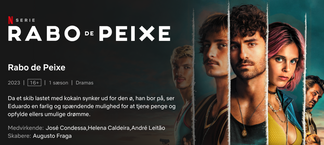









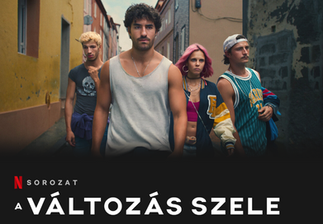

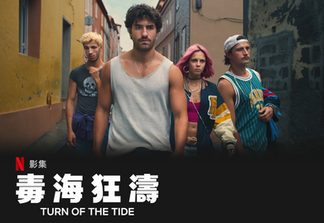





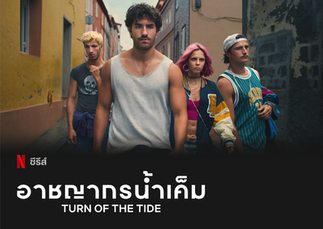



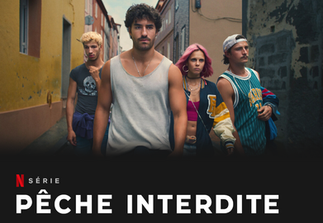




Comments